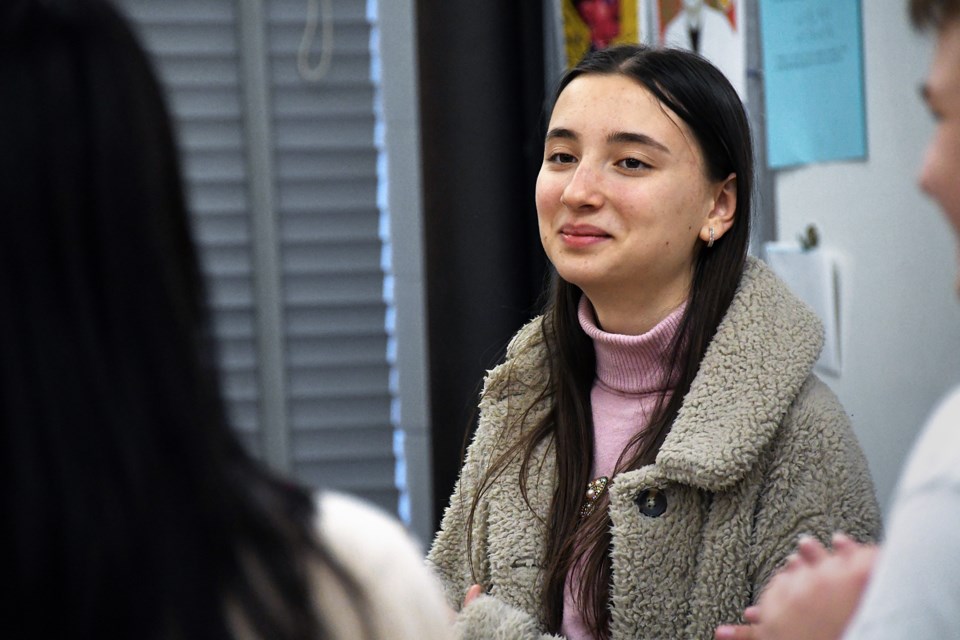Vika Izyhk hasn’t seen her father for nearly a year.
The 17-year-old Burnaby North Secondary School student arrived in Canada via Poland with her mother and sister in August, but her father had to stay behind in Ukraine.
“It’s very bad for me,” she says, explaining she and her father have been close since the day she was born. “It’s hard. But he can’t be here now.”
Izyhk says she worries about her dad, wonders if he is OK and how he is feeling.
In the meantime, she’s also adjusting to life in a new country, a new school, a new language, new friends.
When it all gets to be too much, she closes her eyes and imagines holding a steaming cup of hot chocolate with marshmallows.
She breathes deeply to take in the chocolatey smell and then blows gently at the imaginary, frothing cup.
It’s a mindfulness exercise she learned during a pilot program for Ukrainian teens at her school, and she says it helps.
“I can use this practice at home when I feel bad. It works for me,” Izyhk says.
Ukrainian teens in Burnaby
Since the Russian invasion of Ukraine nearly a year ago, the Burnaby school district has registered 130 children and youth whose families have come to Canada to escape the war, according to Natalya Khan, coordinator of Burnaby’s Settlement Workers in Schools (SWIS) program.
Forty of the new students are in high school.
Working with Ukrainian families, Khan says parents told her their teenage children were having the hardest time adjusting to life in Canada and dealing with stress related to the war at home.
“Youth, they were affected more than any other age groups that arrived,” Khan says.
To help, the SWIS team launched the pilot program at Burnaby North Secondary School – the high school with the largest contingent of Ukrainian newcomers.
For four weeks in January, the Ukrainian teens at the school met every Tuesday afternoon to share a meal, participate in icebreaker activities and learn techniques from therapist Phoebe Tsang to cope with stress and anxiety.
‘I need somebody to talk to how I want’
Tsang says she tried to provide the students with “a smorgasbord of different techniques” to help shift their minds and bodies out of dysregulated states – those times when stress or anxiety send them into fight-or-flight-or-freeze mode.
Breathing rate is an important indicator, Tsang says, so she took the teens through a mini-experiment, challenging them to measure their breaths per minute before and after the hot chocolate exercise, which is designed to slow and control breathing.
And just getting the students together with others who speak the same language helps to combat another common trauma response – isolation.
“When we’re anxious, we shut down. We keep it to ourselves,” Tsang says.
For 14-year-old Ihor Boiko, who arrived in Canada on Sept. 7 after six months in the Netherlands, landing in a new country and a new school was “confusing” at first, especially because of the language barrier.
He’s made other friends, but he says getting together with other Ukrainian teens is important.
“I can speak with people the same language as me, and it’s really important to me here because I can’t speak English very good, so I need somebody to talk to how I want,” Boiko says.
‘They will be struggling like I did’
Since Tsang doesn’t speak a word of Ukrainian, the pilot program relied on two translators for help.
Immigration, Refugees and Citizenship Canada is funding one Ukrainian-speaking SWIS worker, Roksolana Uhryniuk, who was hired in October.
But Ukrainian students and families have also gotten help from a 23-year-old BCIT student who knows what it’s like to be a teen starting over in the new country.
Victoria Shabatina, a 2018 Moscrop Secondary School grad, came to Burnaby from Ukraine in 2014 when she was 14 years old and still has family and friends there.
When Russian troops marched into her home country in February 2022, she says she was glued to the news “24/7.”
She decided she had to act and reached out to the school district in June to volunteer.
“I know there’s kids coming in, and they will be struggling like I did, and I’m sure they will need some help,” she says.
Since June, Shabatina has forged bonds with the teens, chaperoning them on field trips when SWIS workers were off in the summer.
She’s become a go-to person for questions about all things Canadian, including post-secondary education and what comes next after high school.
“It’s like a chain of kindness,” Khan says of Shabatina’s decision to give back to the SWIS program, which had supported her as a teen.
Follow Cornelia Naylor on Twitter @CorNaylor
Email [email protected]




